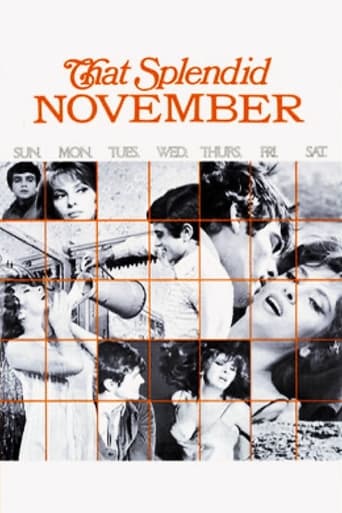info-627-664439
"That Splendid November" is director Mauro Bolognini's 1969 film that is a very interesting telling based on a novel by Ercole Patti with its script by Lucia Drudi Demby, Antonio Altoviti and Attilio Riccio but very much a blending of two kinds of Bolognini film. Many of Bolognini's films are very earnest examinations of the Sicilian/Italian lifestyle usually in period, but a few tend toward bold, lusty soap opera and "That Splendid November" tells of an modern Italian family and its rather sordid interior, especially "Aunt Cettina" (Gina Lollobrigida)and 17 year old nephew "Nino"" (Paolo Turco (Radley Metzger's "The Lickerish Quartet")). Lollobrigida's is one of Bolognini's strong female characters he excels at presenting as the antithesis of leading male characters who are unable to do the work needed to rise above their stations in life, but here she is a bit far flown and not at all sympathetic and too sexy to be believable. Turco is just right, even to being too wooden. Turco should have had a star billing than Gabriele Ferzetti and Andre Lawrence who merely compete for her affections in a rather benign way as far as dramatic conflict in the story, but it is Paolo's picture opposite Lollobrigida, at times with her bordering camp. The cinematography by Armando Nanuzzi is at times breathtaking, while the editing by Roberto Perpignani and Ennio Morricone's score seem somewhat misguided, but it is a very interesting and admirable attempt by Bolognini to make that sumptuous picture he is well capable of making (perhaps such a film is "Bubu"), somewhat shocking, and definitely "splendid." And things never get too out of hand, perhaps that is what is wrong, the movie never satisfyingly tells us anything committed and we are left with portentousness.
ricbigi
I have not read Ercole Patti's novel but Bolognini's UN BELLISSIMO NOVEMBRE seems to be a serious attempt at evoking the Sicilian society depicted by the writer in cinematic terms. This is not a pleasant film. None of the characters are likable and some of them strike one as definitely grotesque. Still, Bolognini shows great understanding of his chosen subject and UBN has many qualities: interesting scenes that comment quite satisfactorily on this particular social milieu, haunting Sicilian locations, excellent cinematography, and a melancholy undercurrent that stays impressed on one's mind. Gina Lollobrigida's Cettina is by far the film's most striking character, a frivolous, amoral woman who does as she pleases in a tightly-controlled, basically rotten family milieu. The actress is most beautiful and portrays her character with her usual intelligence and sensibility, even though most people are unable to see her very real qualities as a performer.
Gerald A. DeLuca
Sicily. Nino has a mom who has sexual relations with other men. Papa doesn't seem to mind. We have a very liberated bourgeois family here, especially for Sicily. Nino falls in love with his beautiful aunt Cettina. This is rendered plausible since the aunt is played by Gina Lollobrigida. There is a tempestuous love scene between nephew and auntie. But the lad is driven to raging jealousy when, surprise, he realizes that she sleeps with other guys as well, and in a frenzy beats her up for not being true to him. Silly kid. He succumbs to family expectations and marries a sweetheart of his own age, but will never stop loving his dear aunt. That's basically all you get in this watered-down version of Ercole Patti's novel. The movie was directed with some verve by Mauro Bolognini, who is very skilled with evoking periods and locales in films like LA GRANDE BOURGEOISE, LA VIACCIA, THE INHERITANCE, and SENILITA'. But this film lives all on the surface and lacks any conviction or depth. There are hints galore here of the aunt/nephew relationship in Bertolucci's youthful masterpiece BEFORE THE REVOLUTION, without that film's dimension of youthful political idealism. Superficially they share similar elements: torrid sex, operatic passions, opera house scenes, criticism of bourgeois values, wedding finales. The music by Ennio Morricone is occasionally very odd, with its boings and twangs more suitable to a spaghetti western than to this kind of 'family' drama.

